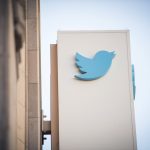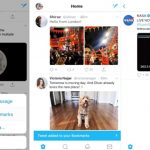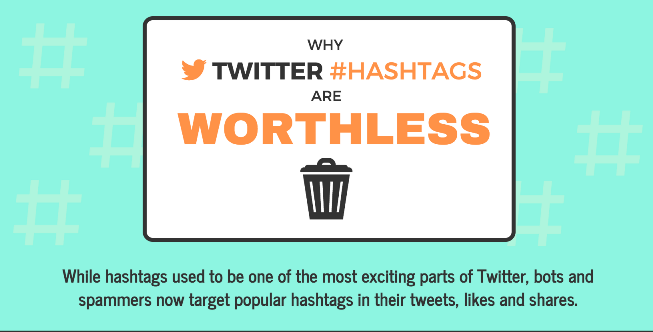56.9% of Twitter Accounts Might Not Be Real [Infographic]
September 6, 2016
Are you someone who uses hashtags in every tweet? Or are you someone who can’t be bothered?
If you’re someone who can’t be bothered, you might actually be doing yourself a favor. According to a study done by Venngage, when used for general content marketing, hashtags are worthless. Or, at least, they attract more spam than authentic interactions.
Yeah, it’s a controversial notion. But think about it: when you use a popular hashtag like #SEO or #ContentMarketing, what kinds of accounts like or share your tweet? Are they legit? Or is there something fishy?
The study looked at a sample of 137,052 tweets over a seven day period to see how many of them came from legitimate accounts, and how many were spam. These samples tweets were taken from some of the most popular hashtags used in the business and marketing fields, including: #Advertising, #GrowthHacking, #DigitalMarketing, #Startup, #ContentMarketing and #SEO.
It’s worth noting that the study didn’t look at how effective hashtags are for connecting people involved in events, or very niche communities. The study looked at general, commonly used hashtags.
The study sorted the Twitter accounts into three categories: Real, Questionable, and ZeroSpam. Real accounts had following, sharing and liking habits that seem natural (more sporadic, the number of people they follow is greater than the number of people who follow them, etc.). Questionable accounts had, well, questionable habits (either their follower or following counts are very high, or their liking and sharing habits are odd and suggest the use of an automation tool). ZeroSpam accounts, otherwise known as retweet farms, shared upwards of 1000 tweets per month and generally follow no one.
The study posits that these ZeroSpam accounts are responsible for many automated interactions that severely skew Twitter metrics. According to the study’s findings, 7.6% of accounts are ZeroSpam–not an insignificant amount. That’s nothing compared to the whopping 56.9% of accounts that are Questionable.
With the number of questionable accounts interacting within these hashtags being so high, is it worth it to use these hashtags anymore?
The author suggests that marketers and business owners eschew these burnt out hashtags for more specific ones, or stop using hashtags all together. He suggests that instead, Twitter should be used to manually reach out to individuals in your industry, to engage in actual conversations. That nugget of advice echoes a recent study written about in the Harvard Business Review, which found that building an emotional connection with customers is more important that customer satisfaction.
This infographic shows the key findings from the study:
![56.9% of Twitter Accounts Might Not Be Real [Infographic] - hashtags infographic](https://www.onlinesalesguidetip.com/wp-content/uploads/2016/09/56.9-of-Twitter-Accounts-Might-Not-Be-Real-Infographic.png)
Via Venngage infographics.
Digital & Social Articles on Business 2 Community
(16)

![56.9% of Twitter Accounts Might Not Be Real [Infographic]](https://www.devicedaily.com/wp-content/uploads/2016/09/56.9-of-Twitter-Accounts-Might-Not-Be-Real-Infographic-Header-520x264.png)












